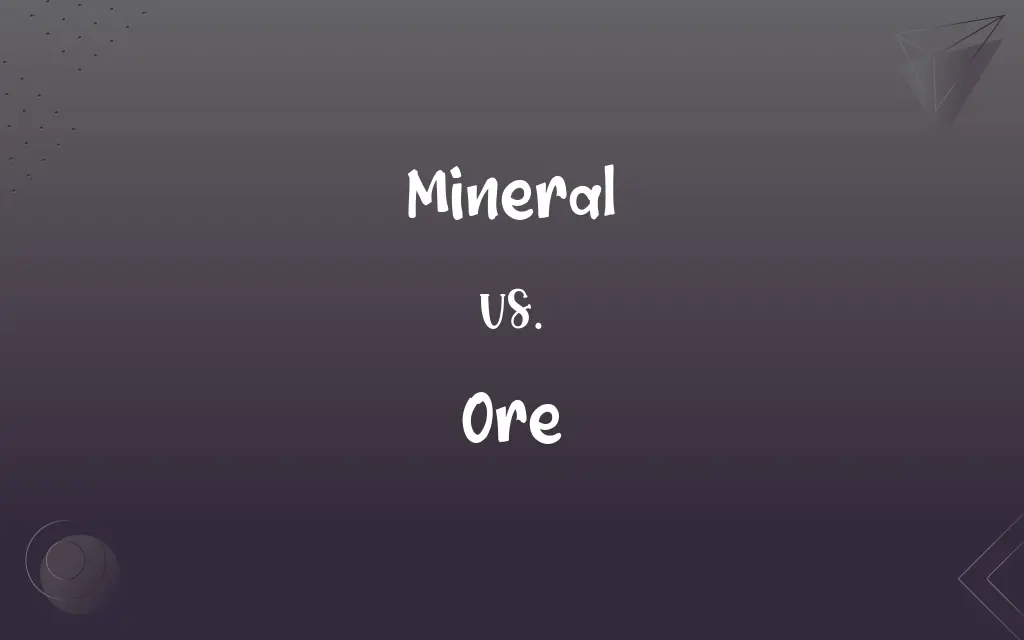Mineral vs. Ore: What's the Difference?
Edited by Janet White || By Harlon Moss || Updated on July 10, 2024
A mineral is a naturally occurring inorganic solid with a defined chemical composition, while an ore is a deposit containing minerals from which metals can be economically extracted.

Key Differences
Minerals and ores are terms used in the field of geology to describe natural resources. A mineral is a naturally occurring, inorganic substance with a specific chemical composition and a well-defined crystal structure. Minerals are the building blocks of rocks and are found in various forms throughout the Earth's crust. Ore, on the other hand, refers to a naturally occurring solid material from which a mineral, typically a metal, can be profitably extracted. In essence, not all minerals are ores, but all ores contain minerals. Ores are classified based on their metal content and the feasibility of extracting that metal. This means that the economic value of the metal and the cost of extraction are key determinants in defining an ore.
For instance, aluminum is extracted from the mineral bauxite. In this case, bauxite acts as the ore for aluminum. While bauxite is a mineral, its classification as an ore is due to the economic feasibility of extracting aluminum from it. Conversely, quartz, a common mineral, is rarely considered an ore because there's no economically valuable metal to be extracted from it.
To further elucidate, consider pyrite, often known as "fool's gold." While pyrite is a mineral, it isn't an ore for gold because it doesn't contain gold in a form or quantity that can be economically extracted. The distinction between mineral and ore, therefore, is largely economic, with ores offering a financial incentive for extraction.
Understanding the difference between minerals and ores is crucial in the mining industry. While minerals provide insights into the geological history and the chemical makeup of an area, ores dictate the economic viability of mining operations in that region.
Comparison Chart
Definition
Naturally occurring inorganic solid
Deposit from which metals can be economically extracted
ADVERTISEMENT
Economic Value
Not necessarily of economic value
Has economic value due to extractable metals
Composition
Can be a single element or compound
Contains one or more minerals
Example
Quartz, feldspar, mica
Bauxite (for aluminum), hematite (for iron)
Use
Studied for geological insights
Mined for extraction of valuable metals
Mineral and Ore Definitions
Mineral
The basic constituents of rocks.
Granite is composed of several minerals including quartz and feldspar.
ADVERTISEMENT
Ore
A natural material bearing minerals in a form and quantity to be economically extracted.
Iron is extracted from the ore known as hematite.
Mineral
An elemental or compound solid found in nature.
Gold is a mineral that has been treasured for its beauty and value.
Ore
A deposit containing valuable metals or minerals.
The discovery of a rich ore can lead to a mining boom in a region.
Mineral
Crystalline substances with defined physical properties.
The luster of a mineral like pyrite often leads to its mistaken identity as gold.
Ore
A source from which metals can be obtained through mining.
Copper ore is mined and then processed to obtain pure copper.
Mineral
A naturally occurring inorganic substance with a specific chemical composition.
Quartz, a common mineral, is composed of silicon and oxygen.
Ore
A concentration of minerals higher than in the average crust.
Bauxite, an ore of aluminum, is primarily found in tropical regions.
Mineral
Materials that are not derived from living organisms.
Unlike coal, which is organic, copper is a mineral.
Ore
Earth's materials that provide economic benefit due to extractable minerals.
Uranium ore is a source of nuclear energy.
Mineral
A naturally occurring, homogeneous inorganic solid substance having a definite chemical composition and characteristic crystalline structure, color, and hardness.
Ore
A mineral or an aggregate of minerals from which a valuable constituent, especially a metal, can be profitably mined or extracted.
Mineral
An element, such as gold or silver.
Ore
A Swedish unit of currency equal to 1/100 of the krona.
Mineral
An organic derivative, such as coal or petroleum.
Ore
Rock or other material that contains valuable or utilitarian materials; primarily a rock containing metals or gems for which it is typically mined and processed.
FAQs
Are all minerals found in ores?
No, only minerals from which metals can be profitably extracted are found in ores.
What's a fundamental difference between a mineral and an ore?
A mineral is a naturally occurring inorganic solid, while an ore is a deposit from which metals can be economically extracted.
Why isn't quartz typically considered an ore?
Quartz isn't an ore because there's no metal in it that can be extracted for profit.
Can a substance be both a mineral and an ore?
Yes, if it's a naturally occurring inorganic solid and has economic value for metal extraction, like bauxite.
Can the definition of an ore change based on technological advancements?
Yes, advancements in extraction technology can make previously uneconomical deposits profitable, redefining them as ores.
What determines if a mineral deposit is classified as an ore?
The economic feasibility of extracting a metal from it determines if a mineral deposit is an ore.
Are minerals renewable?
No, minerals are finite resources, although they're abundant in nature.
Why are some ores more valuable than others?
The value of an ore depends on the type and concentration of metal/mineral it contains and market demand.
Why is bauxite considered an ore?
Bauxite is an ore because it can be profitably processed to extract aluminum.
What role do geologists play in the identification of ores?
Geologists study rock formations and use various tests to determine the presence and concentration of ores.
Are all ores mined for metals?
Mostly, but some ores might be mined for non-metallic minerals that have economic value.
How are the economic values of ores determined?
Through market prices of metals, extraction costs, and the concentration of the metal in the ore.
What's the most common mineral on Earth's crust?
Feldspar is the most common mineral in Earth's crust.
Is diamond an ore?
Diamond itself is a mineral, but the rock containing diamonds can be considered an ore if extraction is economically viable.
Can a rock be a mineral?
No, a rock is composed of one or more minerals.
Are minerals only found in solid form?
Typically, yes; minerals are naturally occurring inorganic solids.
Can one ore contain multiple minerals?
Yes, an ore can contain multiple minerals, but usually, one is the primary target for extraction.
Is coal a mineral or an ore?
Coal is organic in origin, so it's neither a mineral nor an ore. It's a rock.
How are minerals identified in a sample?
Minerals are identified by their physical properties, such as hardness, luster, and streak.
Can the classification of a mineral as an ore change over time?
Yes, if extraction methods improve or market prices change, a mineral deposit might become an ore.
About Author
Written by
Harlon MossHarlon is a seasoned quality moderator and accomplished content writer for Difference Wiki. An alumnus of the prestigious University of California, he earned his degree in Computer Science. Leveraging his academic background, Harlon brings a meticulous and informed perspective to his work, ensuring content accuracy and excellence.
Edited by
Janet WhiteJanet White has been an esteemed writer and blogger for Difference Wiki. Holding a Master's degree in Science and Medical Journalism from the prestigious Boston University, she has consistently demonstrated her expertise and passion for her field. When she's not immersed in her work, Janet relishes her time exercising, delving into a good book, and cherishing moments with friends and family.































































